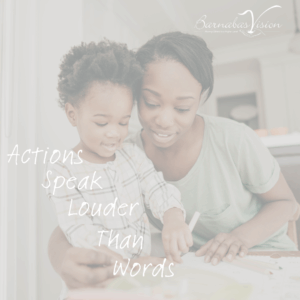Are you inadvertently derailing your child’s self-esteem?
“Children are not a distraction from more important work. They are the most important work.”
Parents want their children to be happy and confident. We work toward positive relationships with them, yet so often feel helpless to save our kids from anxiety and low self-esteem.
Kids today have more opportunities, more privileges, and more stuff, yet they are less confident in their own intrinsic value. Why? The usual culprits—social media inundation and technology bred isolation—are partly to blame. But there are also three ways parents inadvertently contribute to poor self-esteem without realizing it.
And it isn’t what you’d think.
Most parents do everything imaginable to promote their kids’ welfare: schedule playdates to establish social skills, join rec sports to learn teamwork, buy preteens the “right” clothes so they “fit in,” take teens to all the events. And volunteer for all the things. Yet after this, we still find ourselves driving home exhausted, too late on a school night, with a distraught kid coming unglued because they weren’t “good enough,” “smart enough,” or “cool enough” for whatever momentary thing “wrecked” their self-esteem. Our hearts break as we pull through some neon-bedecked drive through for milkshakes, knowing this isn’t the answer. But it’s all we’ve got left.
Take heart, parents. You’re not alone. But how do we navigate this choppy self-worth sea of friend groups, team sports, body image, social media, and bullying?
With three failsafe parenting tools you already have, that build true inner joy, strength and confidence.
Tool # 1. Truth. Too often we all look for worth in all the wrong places. Even parents reinforce the false belief that worth is based on external things about us. But our kids’ worth isn’t based on their abilities, performance, appearance, behavior, friendships, or anything else about “themselves.” Their worth isn’t self-worth at all. It flows from their identity in Christ as a child of God and his precious creation. Ephesians 2:10 says, “For we are God’s workmanship (also translated creation, handiwork, or work of art), created in Christ Jesus to do good works, which God prepared in advance for us to do.”
If we believe our worth depends on us, and we fall short of some arbitrary standard, it reinforces our belief that we’re not worthy. Parents must pour the fundamental truth, that our worth depends solely on the One who made us, into the hearts of our children. But this vital message is not communicated only with words. If our mouths say this, but our actions speak the opposite message, our words mean nothing.
So, how do we align our actions to communicate God’s truth?
With tools two and three.
Tool # 2. Time
One culprit devastating our kids’ confidence is the unwitting misappropriation of time. Families are so busy they’re spending less time engaging in the human interactions that make life worth living. FOMO has taken up residence in our hearts, causing us to over-commit and over-schedule. We believe we do this for our kids’ benefit. We don’t want them to miss any opportunity, so we play every sport, take every lesson, learn every hobby.
But perpetual busyness results in hectic schedules full of structured events, external goals, and frazzled families. Time spent together is often distracted and void of meaningful conversations. There’s little connection when everyone’s irritable or on their phone.
Kids whose parents are too busy hauling them places to spend quality time with them feel undervalued. Material fixes—the latest toy/device/clothes—don’t fill the human connection gap in their souls. So, kids seek connection and validation elsewhere, and the alternatives aren’t good.
Take time to be present with your kids.
Make eye contact. Show them you’re listening. Show them they’re worth your undivided attention. That they’re God’s most valuable and precious gift to you.
Silence the screens and spend time talking. Over meals, walks, cooking, or playing games.
Listen to whatever they have to say. Even if the longwinded tale feels like a goofy episode of preteen TV. The important stuff surfaces amidst the chatter. An hour of small talk may lead to an important revelation. Because only after unloading the “fluff” do they get to what’s buried in the depth of their hearts. You must be there, patiently listening for it.
Time is our most valuable resource. We invest time in what we value.
Kids know this.
Spending quality time with them declares unequivocably, “You are important.”
– Elisabeth Gay
(Tool #3 coming in Actions Speak Louder than Words Part 2.)

